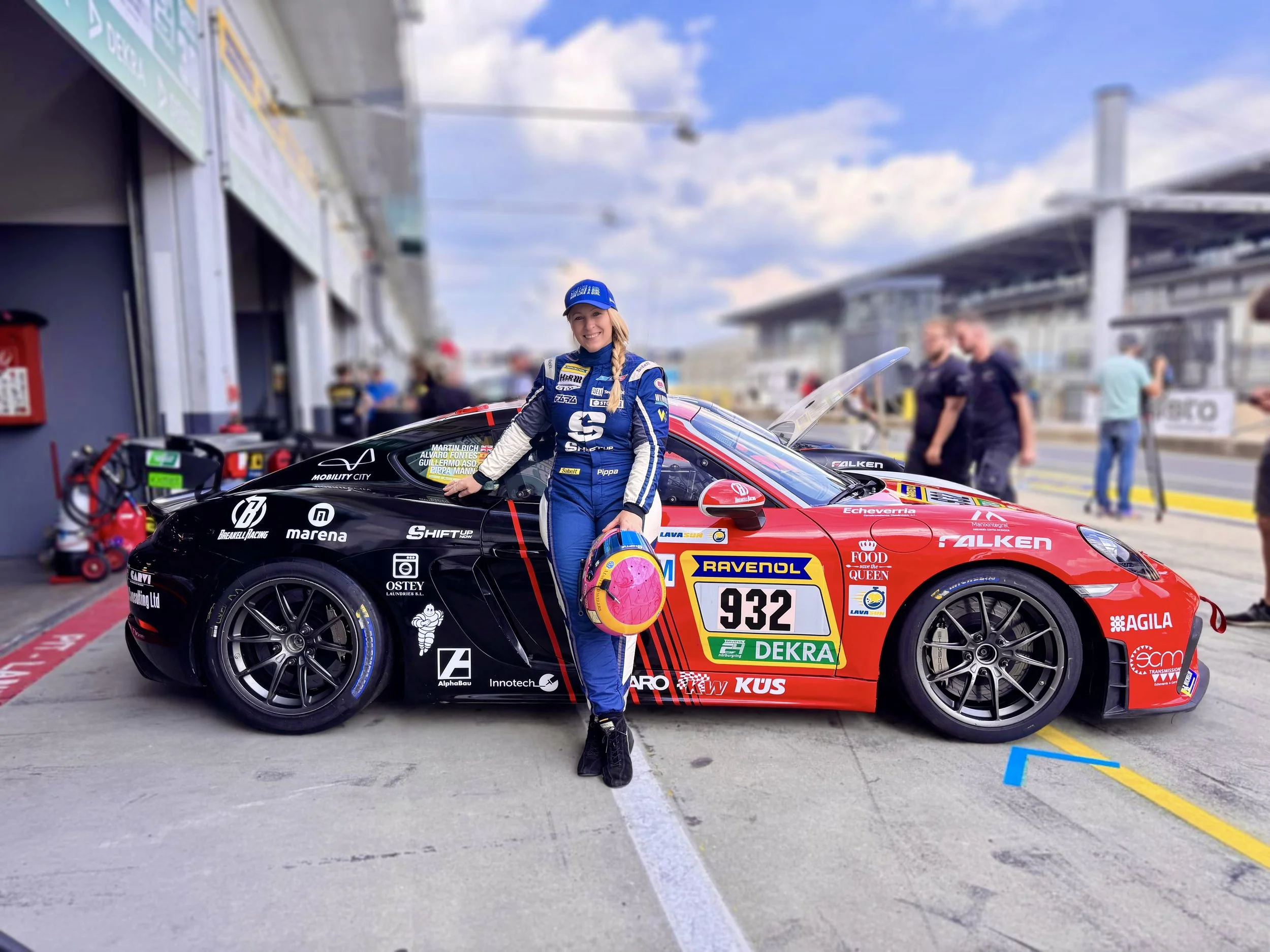Race Car Driver Pippa Mann is Investing in Women’s Motorsports Future
Pippa Mann is a British-born race car driver who is steeped in motorsports culture, on and off the track. Her list of accomplishments at the wheel is impressive — she is a seven-time Indianapolis 500 competitor.For over a decade, she has made the record books for her skills and tenacity as the first woman to win a pole position at Indianapolis Motor Speedway and one of three women to win in the Indy NXT series. She still competes, coaches, and devotes much of time training drivers to be race ready. Pippa’s passion extends to the business of motorsports. She is the C.E.O. of Shift Up Now, an organization that supports and secures sponsorship for women drivers across multiple series. The organization takes a creative approach to engage fans through a paid fan club called “The Inside Track.” The Shift Up Now Foundation is the non-profit arm that provides grants to racers to close gaps in funding. The foundation will hold its gala in Indianapolis on Oct. 25 and tickets are still available. We spoke to Mann about what racing means to her and her advocacy to support women in the sport.
What made you fall in love with driving and motorsports?
When I was a little girl I used to alternate between playing with dolls and playing with toy cars, and I loved watching Formula 1 cars race for as long as I can remember too. I think my dad took me to my first ever in-person race when I was around 7 or 8 years old, and I was about 10 when he took me to Silverstone to watch F1. Growing up as the daughter of a race fan, rather than someone who was in the industry, we had no idea that I could drive myself in karts at such a young age, but I was always encouraging my dad to sign up for track days so I could ride around with him in his car on the race track, and get rides from the various pros in their cars at those events. My dad finally took me to a kids' day at an indoor kart club when I was around 12 years old, and the young man running it pulled us aside, and explained to us what “proper karting” was. I got my first kart for my 13th birthday, and I’ve never looked back since.
You still get behind the wheel, both racing and training drivers. What continues to inspire you to do this and how has it evolved over time?
Motorsport is a tough industry to make a living in — in many ways even more so as a woman — but driving race cars has always been my first love. I also work as a performance driving coach for brands, am about to start as an Expert Host for F1 in Austin, and coach in a series. Any time I can get my hands on the steering wheel to share a race car with someone, that right there, that’s living the dream.
I’d love to have the opportunity to work with more female racers who work with coaches and co-drivers. I’d love a chance to race with clients in some of the bigger paddocks, or find a sponsor to back me so that I wasn’t always reliant on the drivers whom I work with to get behind the wheel. In reality, I just want to drive.
What is your greatest memory behind the wheel?
I have so many. Taking pole at Indianapolis Motor Speedway in Indy Nxt, and winning a race later that year. Qualifying for my first Indy 500, and qualifying for my seventh in the Clauson Marshall Racing Driven 2 Save Lives car. Getting to do the restart this year at the Nurburgring 24 hour race and going from 9th to 5th in our class and setting 4th fastest lap of the race, and then getting back in the same car at night and having my best night stint I’ve ever had yet on the Nordschleife. I’m always chasing those moments where I have the opportunity to do what I love and excel.
What are the most important qualities it takes to become a great driver?
You have to have good reactions, and a good “feel” for what the car is doing underneath you. You have to have the confidence in your own abilities, and be willing to take the car to the edge corner after corner, lap after lap. Outside the race car you have to be incredibly determined, and just like any professional athlete learning how to have a very thick skin is super important.
When do girls need to start driving? What are the first steps to becoming a driver?
To rise to the top of the sport, and become a paid professional racer it’s generally important to start as early as possible — around 6 years old — the same age the boys start. However many people come to racing later in life, when they have already made enough money to go racing, and this is also a very normal pathway. This often starts with track days — people taking their car to the track and lapping in a controlled environment, and then progresses to club racing. Most racers seek out a coach at this point in time to work with them, and help them continue to get better. Most coaches are also very accomplished drivers.
How does your experience as a race car driver shape your work in motorsports?
As a rule women are generally judged only on our prior to date results, whereas men are judged on their potential. In motorsport this affects the sponsorship you’re able to bring to the table, which affects the equipment you’re racing in, the seat time (practice) you get, the coaching you can afford, and all of this ultimately is often reflected in your results. It’s the same on the coaching side. I’m often overlooked for work by those who tell me I don’t have the correct experience, then hire someone with less experience than me. For many years of my career I thought I was the problem. However, the more women I connected with in the sport, the more I realized this was a global problem, and the more I became driven to try and drive change.
How does Shift Up Now help the next generation of women who are pursuing a future in racing?
The goal of Shift Up Now is to help talented female racers in motorsport close the funding gap. We do this both through our for-profit business, which deals with sponsorships, social media deals, and appearance fees for our racers, and through our 501c3 Foundation, which writes grants for racers. We focus mainly on those who are already racing at a professional and semi-professional level as the need at this level to close that funding gap is huge. Just this year alone several talented racers who have been competing towards the front of their respective Championships have had to step out of rides mid season, due to a lack of funding or miss races. We’re trying to help keep talent behind the wheel. We want to be able to find bigger sponsorships, write larger grants, and generally become that resource that so many female racers need to be able to continue their careers.
What have some of the drivers accomplished through the support of Shift Up Now that you're most proud of to date?
Last year, at Pikes Peak, Laura Hayes won the inaugural GT4 Trophy by Yokohama, and set the record for the fastest woman ever up the Mountain. This year, in her debut season in GT4 America, she and her team-mate just won their first race in class. In Porsche Sprint Challenge, Loni Unser just won her first race in the category a month ago at Watkins Glen, and finished second in the Championship, while her team-mate and series rookie Erika Hoffmann also won a race in her debut season at the final event of the season at Road Atlanta. Erin Vogel currently fields an all female endurance racing program in the World Racing League, and we’re so proud to have board members like Erin who don’t just talk the talk about supporting talented female racers, they walk the walk. Yokohama also worked with us in 2023 to create an entire Shift Up Now Livery on Ashley Freiberg’s Porsche Cup Car when she romped to the Porsche Sprint Challenge 991.2 Championship, and we loved seeing Ashley debut alongside another of our athletes Sabré Cook in Porsche Carrera Cup this year.
Racing is a collaborative team sport. How do you work with other organizations, partners, and teams?
The big thing is we try to help support the drivers without interfering. Our goal is to help them achieve their goals, and we believe that when men and women are funded equally in motorsport and have equal opportunity, they race as equals, resulting in more women competing at the front of the field, standing on podiums, and winning races. The great thing about the progress the sport has made is that many teams now have the same beliefs as we do - that women can be just as fast as men behind the wheel, but the bad news is that a lot of the time the teams are not the ones with the money.
The big shift will come when we’re able to convince the sponsors and partners to back female talent, and to do so with the same enthusiasm and level of financial support and activation that they do for our male counterparts, and that’s the shift we’re striving for as we push to drive equity in motorsport.

